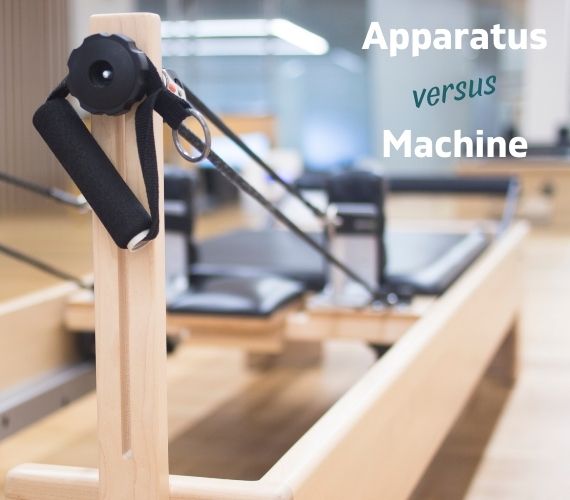
Apparatus, why not machine?
While reading an essay about Pilates last week, a sentence stood out for me. I read it in the first essay of a collection of twenty-eight essays from “Voices of Classical Pilates” volume 1, published in 2013. David Freeman, the writer of the text, reflects on how Pilates completely changed his life. Discovering Pilates led him to make a big career change; he left his attorney career at the age of 45 to study and become a Pilates teacher under the “watchful eyes of Romana Kryzanowska”. He was nearly 20 years into his new career when his text was published, and his passion for Pilates is evident. Quite early in the text, he mentions how Romana once emphasised the word to use when referring to Pilates equipment: “Pilates equipment is called “apparatus” (instead of machines) because the person should be in control, not the equipment.”
It was interesting because, during my Pilates journey, I have heard the equipment called apparatus, machines and devices. All along, I just assumed that they were all synonyms and never really stopped to think about it all. There is so much to learn in the mastery of this method that using one word over the other, apparatus versus machine, was not a priority to contemplate. I just accepted that they were the words we used to describe the equipment. Surprisingly, this statement about apparatus and its signification is what stood out for me in David’s text. I am unsure why; I suppose I was ready to receive this information and explore its meaning. It made me think, wanting to make sense of it for myself. We always say that words have power in Pilates, to choose well to have the right impact and guide well. Maybe it is the same for the way we describe the equipment. I pondered about the difference; perhaps I missed the subtleties in the meaning of the words; after all, English isn’t my first language.
Apparatus versus machine – definitions and synonyms
True to our modern world ways, I started my Google search. I was interested in demystifying the nuances between the two words (apparatus versus machine) and found several definitions for each word. I also looked at synonyms for each of them, and they are synonyms! I was not completely off track. In fact, they share most other synonyms. They are interchangeable words on a superficial level but maybe less so when applying a philosophy to the meaning. When used as a noun, the biggest difference in the description is the mention of “mechanical power and/or energy” for a machine. None of the definitions for apparatus has an electrical or mechanical connotation to it. However, apparatus is what the gymnastic equipment is called. Pilates has a gymnastic feel in its repertoire, so the connection made sense. I did not come across anything specific mentioning the necessity of a “human being in control of the equipment” for either word. However, both are to be used to accomplish a particular use, task or activity. I liked the third description listed below for a machine; directing, controlling energy in the form of movement to assist in performing human tasks. That, to me makes sense with Pilates equipment and its intent. Joseph himself called his equipment machines and said the following about his inventions and reasons:
“I invented all these machines….. it resists your movements in just the right way, so those inner muscles really have to work against it. That way you can concentrate on movement. You must always do it slowly and smoothly. Then your whole body is in it.” Joseph H Pilates
To me, to “resists your movements in just the right way” requires control of energy, and it is a way of assisting the movement. Regardless of it all, the mere fact that Joseph referred to his equipment as machines gives me carte blanche to do so as well but with his spirit in mind.
Apparatus
- A set of materials or equipment designed for a particular use.
- The technical equipment or machinery needed for a particular activity or purpose.
- Any of the equipment on which the gymnasts perform their movements.
Machine
- An apparatus using mechanical power and having several parts, each with a definite function and together performing a particular task.
- Any mechanical or electrical device that transmits or modifies energy to perform or assist in the performance of human tasks
- A device that directs and controls energy, often in the form of movement or electricity, to produce a certain effect.
- It is a tool or invention which multiplies the effect of human effort.
A case of interpretation?
So, what made Romana say that “apparatus” was the word to use over the others? I am not sure; I never met her. However, I think perhaps her interpretation of the word and what it meant to her. Also, when she made this statement to David, it was somewhere in the 1990s; the world was a different place by then. Computers were already controlling most machinery; humans were not as much in control of machines. Joseph was born in 1883; he lived most of his life with machines that needed to be controlled or assisted by humans even if they were designed to “multiply the effect of a human effort”. In Joseph’s book Return to Life through Contrology, he speaks of the “giant ocean liner” and the necessity for the stoker to never stop firing the boilers, leading to the understanding that the boat would stop operating if the stoker took the night off. In this instance, the metaphor is about the necessity of humans to take greater care of their “own machine”, their body. However, it also speaks of a relationship between a machine and a human. That relationship is a lot less present these days; it feels more like machinery is controlling us. Joseph did not experience fancy computerised machinery and smartphones. His interpretation of machines was undoubtedly very different from what we think of them now or even back in the 1990s. Romana was born in 1923; by the time the ’90s arrived, she’d observed many engineering changes over her 70 years of life. I would not be surprised if she thought about what machines had become and decided that the meaning of this word was no longer embodying what she was teaching. Therefore, apparatus, a word already used in gymnastics for equipment, and its non-power fueled aspect was a better choice.
Building a relationship
In my Pilates practice, I have a relationship with all the equipment that I use. I make mindful decisions on using it correctly and in a way that will challenge and assist me in performing the exercises. It is never a mindless ride. Some relationships are easier than others to build and maintain, but ultimately, they all “have my back”, sort to speak. In my teaching try to get my clients to develop their own relationships with the equipment. Pilates equipment looks and feels archaic; none of it is controlled via special remotes to start it, run it and stop it. The body has to “work against it”, as per Joe’s own words. So perhaps, now that machines play a very different role in our modern lives, the word no longer represents what Pilates equipment is, unless, of course, if used with the spirit of an early 1900’s practitioner.
I extended my search to the word device: “a thing made or adapted for a particular purpose”; it has both apparatus and machine for synonyms. For me, this one refers more to smaller objects; the mighty Pilates gadgets such as the foot corrector, the breath-a-cizer, the neck stretcher, toe corrector, hand tens-o-meter, etc. All the little pieces that often sit quietly in the corner of a studio but when utilised have a big impact because of their “particular purpose”.
While I was going through this interpretation process, a colleague that I esteem greatly, Benjamin Degenhardt, also approached the subject of apparatus in a post on his 360 Pilates Instagram account. His post had a humoristic approach, mentioning how we all struggle with the plural for the word apparatus. It amused me that we both picked the naming of the equipment as a discussion subject. We just did it for different reasons. However, his post also included three definitions of the word, a short text confirming that Joseph also used devices and machines for his equipment.
So, apparatus or machines? Maybe apparatus for singular use, machines in plural and devices for all the small but mighty pieces. The important is to keep on moving with intent, control and enjoy it!
Eve Fairbairn, PAA Committee member

Comments are closed.